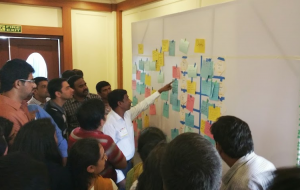On Distributed Teams - Kaizen Camp Bangalore
Trust is not between teams, it is between individuals. ~ Sunil
I am in the world’s epicenter of offshoring, Bangalore, India. We just spent several days running a Kaizen Camp and keynoting SolutionIQ's sold out Lean India Summit.
We work a lot with distributed teams and not surprisingly the Kaizen Camp surfaced a lot of issues around offshoring or the perils of distributed teams. (This is a slice of the conversations which were varied and deep.) At Kaizen Camp, we seek to provide people with epiphanies - game changing realizations that will have a direct impact on their work and life.
Here are some that I had or witnessed (and they are very coordinate to what our clients in the states are saying).
Everyone Cares About Making Distributed Teams Work - There are challenges around distributed teams, everyone recognizes that - whether it’s a project manager in Boston or a tester in Chennai. But also to a person, everyone wants to fix it. Yes, some people want to consolidate their teams but most people recognize that talent lies in people and people have homes. Sometimes that home isn’t where you are. The need for project success is important to everyone.
Communication is Key - Information flowing from person to person or group to group is usually sufficient, but not always. The problem here is that “usually” (maybe 70% of the time) is not good enough. Small communication breakdowns create cascading problems for work. Deadlines slide, defects mount, and misdirected designs build upon each other. The ability to communicate current work (who is working, how they are working, what is being done, what is in peril, what discoveries have been made, what requirements are more complex than we expected) is a linchpin for distributed team success.
Communication Can Be Inconvenient - We want to communicate, but we are not always the best at it. Timezones and busy schedules can frustrate this. Deadlines abhor communication. Therefore, quite often, distributed teams will try to solve problems in isolation or simply ignore concerns and soldier on in service of the deadline. Creating convenient and expected lines of communication that account for timezones and don’t carry political weight (why are you slowing us down with this meeting?!) are crucial for successful distributed teams.
Alignment is a Moving Target - Alignment is a mutual understanding of purpose, direction, and expected action. Since our understanding of our projects advance and evolve as the project continues and we are constantly making decisions, alignment should advance and evolve with it. In distributed teams, small and large decisions are made in various offices or by various individuals every day. When they are not communicated, alignment breaks down (quickly). Successful teams require alignment resets much more often than is common.
Understanding Trumps Culture - We are quick to blame cultural differences on breakdowns in workflow or alignment because culture is an easy scapegoat. Most problems we’ve seen, however, are between well-intentioned capable humans on both sides of the pond. The problems are rarely actually cultural, they are usually misunderstandings of work (intent, scope, or complexity) or the result of drift in alignment. Building systems that help keep these on track is a common hallmark of a successful distributed team.
Towards a Shared Mindset - Whether it’s Lean mindset or something else, there was a strong drive to understand why we are working together and how we are going to accomplish our mutual goals. Clarity of thought, of process, and of the culture of the distributed team as a whole (team culture), was foremost in people’s minds at Kaizen Camp. Building a common culture of mutual respect, understanding of the work, and a drive to complete quality product was present in almost every discussion.
Closing
Distributed teams challenges, in my opinion, largely come from the thin mechanisms of communication we create. Communication doesn’t have to be video calls, but it needs to be personal, useful, and understandable.
Jim Benson @ourfounder
